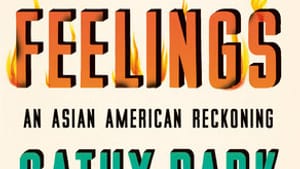Open demands for justice
‘Minor Feelings: An Asian American Reckoning’ by Cathy Park Hong

Before I read Cathy Park Hong’s 2020 essay collection, Minor Feelings: An Asian American Reckoning, my consumption of Asian authors was limited to novels on the immigrant experience. Minor Feelings felt like a portal into a new dimension, impacting me on a cellular level. Hong deftly explores Asian American consciousness, giving timely commentary amidst increasing anti-Asian hate crimes during the pandemic.
Asian American visibility, representation, and justice have always seemed to be an afterthought in this country. Hong struggled for most of her life to prove her existence: “My confidence was impoverished from a lifelong diet of conditional love and a society who thinks I'm as interchangeable as lint.”
As an Indian American, I can relate. Throughout my own life I have felt varying levels of overt, closeted, or thinly veiled racism and xenophobia, with these experiences forming my view of the world and my place in it.
“You don’t know white people like I do”
Minor Feelings delivers a necessary, radical, and groundbreaking education for Asian Americans and non-Asians alike. Hong details how draining it can be to patiently educate a clueless white person about race.
“It’s like explaining to a person why you exist, or why you feel pain, or why your reality is distinct from their reality. Except it’s even trickier than that. Because the person has all of Western history, politics, literature, and mass culture on their side, proving that you don’t exist,” Hong writes.
Interactions with white people dismissing or diminishing my lived experience as a brown child of Indian immigrants is exhausting, particularly when I’m asked to do the emotional labor of enlightening them on the subject of race and the immigrant experience. I remember a heated discussion with a white, liberal friend where she was attempting to take ownership of her white privilege and said, “You don’t know white people like I do.” I wanted to scream, “No, YOU don’t know white people like I do.”
Writing for the white gaze
Minor Feelings details how the publishing industry tends to sell only one kind of immigrant story, focused on struggle and triumph, packaging the immigrant experience into a single note that is easily digestible for a white audience.
Wanting people to learn about my Indian culture, I sometimes found myself cherry-picking stories of elephant rides in India and delicious home-cooked curry, rather than those surrounding racial bullying and identity politics that made my experience as an Indian American ripe with pain. Growing tired of the "triumphant overcoming struggle" narrative, I’m done letting people off the hook for their ignorance and avoidance of this country’s harmful legacy of bigotry and xenophobia against Asians.
Hong reflects on how her writing was always created to the standard set forth by white teachers and critics. She was “raised and educated to please white people and this desire to please has become ingrained into my consciousness. Even to declare that I’m writing for myself would still mean I’m writing to a part of me that wants to please white people,” Hong says. “I didn’t know how to escape it.”
When I was starting out in comedy, it was impossible not to see how the scene was dominated by white people, especially straight, white, cis men. By dumbing things down or framing my cultural identity and experiences in a way that white people can appreciate, I worried that I was selling out my culture for the gains of white approval or entertainment. When I do stand-up, I’m always conscious of what’s going to make white people clench up. How far can I push without making them so uncomfortable they won’t laugh? How can I roast white people without fully activating their white guilt? How can I speak my truth while exposing theirs and all the while make it funny?

“Minor feelings”
Hong defines “minor feelings” as the range of emotions built from the everyday experience of constantly having one’s perception of reality questioned or dismissed. “Minor feelings arise, for instance, upon hearing a slight, knowing it’s racial, and being told, Oh, that’s all in your head,” Hong writes. “Our feelings are overreactions because our lived experiences of structural inequity are not commensurate with their deluded reality.”
Since the pandemic began, nearly 3,800 hate-related incidents against Asian Americans have been reported, including verbal harassment and physical attacks targeting East Asians. Many major US cities, like New York and San Francisco, reported anti-Asian hate crimes rose nearly 150 percent in 2020. A misconception that Asians are weak or passive further emboldens racist attacks against them.
But the community is fighting back against white supremacist delusions with initiatives like Stop AAPI Hate, a national coalition formed during the pandemic to address, track, and provide resources regarding the escalation of anti-Asian violence and discrimination. If white people knew the history of this discrimination, Hong says, they could be held accountable for it, but “rather than face that shame, they’d rather, by any means necessary, maintain their innocence.”
Building solidarity
In a recent interview with The Atlantic, Hong stresses the importance of building a cross-cultural community among Asian Americans that also bridges Black, Latino, and Indigenous communities. “And right now, we’re not really there yet,” says Hong. It’s tricky to talk about racism in this country, where it often feels like mainstream media and activists have only enough time for championing one cause or highlighting injustice against one ethnic group at a time.
I’ve felt reluctant in the past to be vocal about racism against Asian Americans because there seems to be an incorrect assumption that we have it easy or don’t have it bad enough. Hong believes that “trauma is not a competitive sport,” but sometimes it can feel that way. Some narratives note a lack of allyship between people of color on issues of racism that, on the surface, don’t affect their own community. But Black Lives Matter has seen a massive outpouring of solidarity from other marginalized communities, and it has been uplifting to see Black and brown activists reciprocating support by spotlighting crimes against the Asian American community, understanding that we can and should fight against racial inequities in this country together.
Validation and visibility
Hong reflects on Asians Americans from the past to the present being “dragged against their will, driven or chased out of their native homes, out of their adopted homes, out of their native country, out of their adopted country: ejected, evicted, exiled.” Minor Feelings made me think more critically about my oppressors while validating my experience as an Asian American who’s never truly felt seen or understood, further inspiring me to openly demand Asian American visibility and justice during a time that desperately needs it.
Image description: The cover of Minor Feelings: An Asian American Reckoning. On a light background, “Minor Feelings” appears in large orange letters with flames on them. The author’s name, Cathy Park Hong, appears in large turquoise text below that.
Image description: A color photo of writer Christina Anthony, riding an Indian elephant on a dirt path with dense green forest around it. The elephant is lifting its trunk and opening its mouth.
What, When, Where
Minor Feelings: An Asian American Reckoning. By Cathy Park Hong. New York: One World, February 25, 2020. 224 pages, hardcover; $27.00. Get it on Bookshop.org.
Sign up for our newsletter
All of the week's new articles, all in one place. Sign up for the free weekly BSR newsletters, and don't miss a conversation.

 Christina Anthony
Christina Anthony